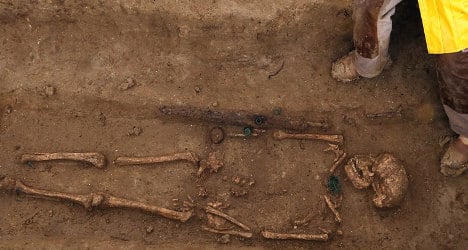Archeologists from the National Institute for Preventive Archaeological Research (Inrap) have been carrying out excavations at the site near Buchères over the course of recent years.
But even they were surprised by their latest discovery at the 260-hectare site, which is set to become the Aube Logistical Park.
Around 30 graves dating back to between 260 and 325 BC were identified at the site, with around half being excavated, revealing the remains of Gaul warriors, with weapons and shields in hand. Women are buried alongside them.
Scientists are surprised by the presence of a burial ground in that particular spot, as there had been no settlements recorded in the area.
Archeologists believe it may have been chosen because it was already a cemetery dating back to the Bronze Age.
The artefacts found are to be taken away and preserved.



 Please whitelist us to continue reading.
Please whitelist us to continue reading.
Member comments